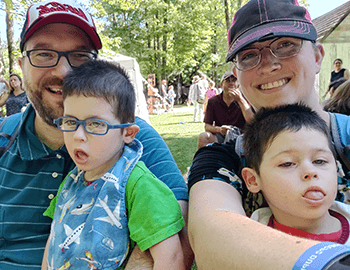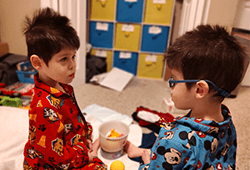Bethany Jaworowski had a relatively normal pregnancy with the twins she was expecting with her husband Josh. She craved spinach and hard-boiled eggs, and she walked a lot. At the end of the pregnancy in November 2017, Bethany developed preeclampsia and was hospitalized for 10 days at UPMC Magee-Womens Hospital.
She showed two of three signs for HELLP syndrome, a rare but serious condition that sometimes happens when a woman is pregnant or right after delivery. HELLP stands for Hemolysis, Elevated Liver enzymes and Low Platelets. She underwent an emergency Cesarean section to deliver Jayden and Josiah (JoJo).
 Immediately, JoJo went into the Neonatal Intensive Care Unit (NICU) because of his breathing. Jayden went back and forth between the NICU and the Mommy and Me Unit because he was having trouble regulating his temperature. He also failed his newborn hearing screening. When Bethany was discharged after four days, both boys were in the NICU.
Immediately, JoJo went into the Neonatal Intensive Care Unit (NICU) because of his breathing. Jayden went back and forth between the NICU and the Mommy and Me Unit because he was having trouble regulating his temperature. He also failed his newborn hearing screening. When Bethany was discharged after four days, both boys were in the NICU.
Although JoJo was able to come home after three weeks in UPMC Magee’s NICU, Jayden remained there. But then, JoJo’s temperature dropped to 92 degrees F. He stopped drinking, eating, peeing, and pooping. He was admitted to UPMC Children’s Hospital of Pittsburgh. Bethany and Josh were exhausted, going back and forth between the two hospitals.
The Diagnosis
When the boys were 6 weeks old, Bethany learned that genetic testing had come back for Jayden. The Jaworowskis had to go to UPMC Children’s to meet with a genetic counselor, Leslie Walsh, for the results.
Bethany and Josh learned that their son Jayden has MECP2 duplication syndrome. Per mecp2d.org, “MECP2 duplication syndrome is a moderate to severe neurodevelopmental disorder. Children affected by MECP2 duplication usually have low muscle tone and strength beginning as infants. They have delays in mental development, speech development and motor development. About three-fourths of the children affected have recurrent lung infections and this is the leading cause of death. 50% of males do die before the age of 25 years old. One-half of the children with the disorder have seizures. A child with MECP2 duplication is more likely to be diagnosed with Autism than a typical child. Also, it is very common to have stomach issues such as reflux and constipation.”
Josh says, “Bethany and I took the news in stride, rather than responding with total devastation. We realized that the Lord had prepared Bethany to be Jayden’s mom as she has a wealth of relevant experiences working with people with special needs. I honestly would not know what to do without her.”
Bethany had worked in the mental health and disability services field for over a decade, so she automatically jumped into professional mode, she says. JoJo was already at Children’s. She got Jayden there too, and both of them in the same room. They had to wait six more weeks for JoJo’s genetic testing to come back to find out if he also had the disorder.
Just a Handful in the World
 In most cases of MECP2 duplication syndrome, the duplication occurs on the x chromosome. In the case of Jayden and JoJo, the duplication occurs on the y chromosome. An expert at another children’s hospital speculates that there may be only four or five cases worldwide on the y chromosome – and that Jayden and JoJo may be the only identical twins with MECP2 duplication syndrome on the y chromosome.
In most cases of MECP2 duplication syndrome, the duplication occurs on the x chromosome. In the case of Jayden and JoJo, the duplication occurs on the y chromosome. An expert at another children’s hospital speculates that there may be only four or five cases worldwide on the y chromosome – and that Jayden and JoJo may be the only identical twins with MECP2 duplication syndrome on the y chromosome.
Even more unbelievable, most cases of MECP2 duplication syndrome are inherited. Usually the mother is the carrier. Some are called de novo, or “of the new.” In the Jaworowskis’ cases, two boys have it, their father’s side has no history of it, and their mother is not a carrier.
“The twins have a rare diagnosis in a rare way. There may be no one quite like them on earth, and that’s special,” says Josh.
Bethany and Josh are thankful it was so early when they got the boys’ diagnosis.
“We had the benefit of finding out early. Unfortunately, many other MECP2 diagnoses come years after birth, so families are left with the frustration of searching for answers for their child’s medical issues,” says Josh.
An Emphasis on Early Intervention
Jayden and JoJo not only got into the same hospital at 6 weeks old, they also started therapies at 7 weeks old. “With my previous work experiences, I was prepared to meet their needs. When we got their diagnosis, I jumped into advocacy mode,” says Bethany. They started to receive Physical Therapy, Occupational Therapy, Speech Therapy, and Developmental Therapy.
One nurse was extremely patient and very encouraging with their g-tubes. From speech therapists to lactation consultants, Bethany says, “they walked with us through the close calls and all the different challenges.” She also credits Child Life for the family support they provide her. “We have recurrent hospitalizations because of infections they get. Child Life gives me art supplies so I can paint and create something beautiful out of a tough time,” she says.
The boys were inpatients at Children’s until Feb. 15, 2018. Then they were transferred to the CHRU – the Children’s Hospital Rehabilitation Unit – until Feb. 21, 2018 – to help the whole family learn the skills they would need to meet their needs.
“Once we were comfortable enough to care for the boys ourselves, CHRU sent us on our way,” says Josh.
Follow Your ABCs
Like the other families with boys with MECP2 duplication syndrome, Visit Navigation Services at UPMC Children’s is an important resource. JoJo and Jayden see 10 to 15 specialists each, both at Children’s and at school. Because both boys have seizures, they see Neurology. They also see Pulmonology, Otolaryngology, the Complex Care Center, the UPMC Children’s Center for NeuroGenomics (CCNG), and more.
“We don’t know what the future holds for the boys, but for us, our community of faith has been helpful,” Bethany says.
She encourages families that might be dealing with a new diagnosis of MECP2 duplication syndrome – or another frightening diagnosis – to follow the ABCs:
- Advocate for your child.
- Build your community.
- Care for yourself (you should be the best version of yourself for what lies ahead).
“You have to have your ABCs together in order to survive and thrive,” Bethany says.









